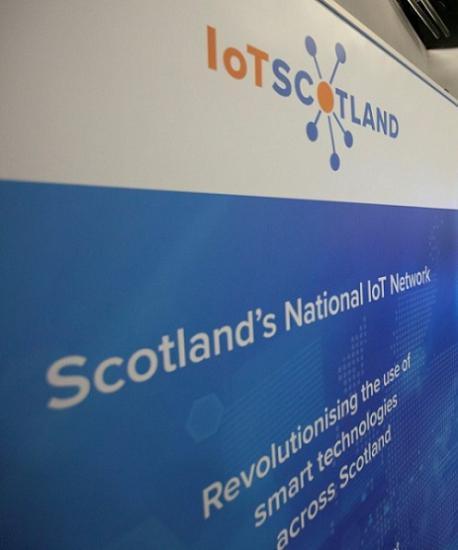Iot Scotland Welcomes First Customer As The Highland Council Introduces Transformational Water Monitoring Technology
13th August 2019

IoT Scotland has welcomed its first customer after The Highland Council selected the open access network to provide IoT connectivity for an innovative and transformational water monitoring contract.
The Highland Council awarded a three-year contract to Dundee-based IoT Scotland partner M2M Cloud to roll out their Neptune water-monitoring sensor technology to over one hundred buildings across their estate. The sensors will be used to remotely gather data from the council's water systems, providing an effective way to monitor and control legionella risk.
Water systems with the right environmental conditions, such as temperatures between 20 - 45, can potentially develop harmful bacteria, such as legionella. To negate this risk, sensors are attached to the surface of water pipes to record temperature readings every 10 seconds. Data captured is then transferred over the IoT Scotland network for The Highland Council to view via an intelligent dashboard.
Real-time alerts notify the building users of changes to the temperature to provide early notification that the water system is out of specification, replacing a previously timely and manual monitoring process where engineers would travel across the council estate to take temperature readings.
The Highland Council is responsible for the largest local government area in the UK. Covering an area larger than Belgium, with a population of over 230,000, the council manages 1100 non domestic properties.
M2M Cloud developed their Neptune technology following a proof of concept trial involving CENSIS - the Innovation Centre for Sensor and Imaging Systems and IoT - which saw the technology rolled out at two Highland Council properties.
The Scottish Government backed IoT Scotland network provides businesses and the public sector with access to affordable IoT connectivity. Allowing them to monitor and potentially control the status, efficiency and productivity of their assets and equipment, and to make more informed data driven decisions that will deliver economic and social benefits and drive operational efficiencies.
Chair of the Highland Council's Environment, Development and Infrastructure Committee, Councillor Allan Henderson said: "The Internet of Things (IoT) has been ‘the next big thing’ for a while now, but in recent years it has developed in a major way, to the point that there are now a number of well tested and useful applications for the public sector. IoT represents a very real opportunity to help local authorities save money, reduce their energy/carbon output and improve service delivery, and a national IoT network provides the connectivity facilitate these projects."
Scott Edgar, Operations Director at M2M Cloud, commented: "Having a National IoT network will enable any business or public sector organisation across the country to potentially access and benefit from Neptune Water Monitoring technology. Neptune helps ensure a water system is compliant and also helps with planned preventative maintenance schemes. The technology can also help organisations react quicker to problems and target resources to the right place saving time and money, while lowering carbon emissions".
The Highland Council project has been part funded through the Scottish Government’s European Regional Development Fund (ERDF), as part of the Strategic Intervention “Scotland’s 8th City – The Smart City.
Related Businesses
Related Articles
Exciting Career Opportunities With The Highland Council Now Open For Applications
# 10 December 2025 Career opportunities with The Highland Council The Highland Council is looking to fill a variety of posts relating to civil engineering and flood risk management based in locations across the area. Included are opportunities specifically for civil engineering graduates and technicians, providing the ideal job with career progression for anyone recently qualified and ready for a varied and interesting role.
What the NC500 Research Projects Are Designed to Do - and Why They Matter for the Highlands
As the North Coast 500 approaches its tenth anniversary, it has become one of Scotland's most well-known tourism success stories. The 516-mile loop around the far north of the Highlands has been celebrated internationally, marketed as a world-class road trip, and credited with transforming visitor numbers in some of Scotland’s most remote areas.Help Shape the Future of Thurso
The Highland Council is inviting people that live, work, or study in Thurso, to come along to the public consultation events to have their say. This is an opportunity to help shape the future of Thurso, to gather views and ideas.
Are Scottish Councils Quietly Reversing Outsourcing? A Look at Insourcing, Cuts and the Highland IT Shift
A notable article in the Guardian on 6 December 2025 noted the high sums being paid by London councils outsourcing services to private firms. The article starts with the reduction in council funding by UK government since 2010.Council welcomes Visitor Levy flexibility plan
The Highland Council welcomes moves by the Scottish Government to introduce greater flexibility on how it could design a Visitor Levy Scheme for consultation. The Visitor Levy (Scotland) Act 2024 currently provides local authorities with discretionary powers to implement percentage-based levies following statutory consultation.Highland Council is reaching out for views to shape its next 26/27 budget.
As it looks to set out its forthcoming priorities, the council is seeking involvement from members of the public, including businesses, community groups, parents, and young people. All their opinions are going to be crucial in deciding how Highland Council will take on its budget challenge for 2026-2027.Have your say in Thurso's future £100million investment by attending public consultation events
Thurso is to benefit from £100m investment in education and community facilities and are rolling out the first phase of public consultations on 9 and 10 December 2025. The Highland Council is inviting people that live, work, or study in Thurso, to come along to the public consultation events to have their say; this is an opportunity to help shape the future of Thurso, to gather views and ideas.Finding new owners for empty homes - Scheme launched to help return more empty homes to active use
A new online portal has been launched to bring empty homeowners together with prospective buyers or developers with the aim of facilitating more properties to be used as homes again. Covering the whole of Scotland, this builds on the success of local pilots, referred to as "matchmaker schemes".Consideration for short term let control area in Skye and Raasay
Steps towards introducing a short term let control area have been considered by Highland Council's Isle of Skye and Raasay area committee. On Monday (1 December 2025) the committee heard evidence to justify the grounds for the introduction of a Short Term Let Control Area covering all or part of Skye and Raasay.Workforce North event spotlights Highland economy
EMPLOYERS and educators from across the Highlands have gathered to hear how a new initiative is aiming to transform the region's economy. Workforce North - A Call to Action brought together business leaders and teachers from primary and secondary schools from across the Highland Council area with a wide range of partners geared towards education, learning and skills development at Strathpeffer Pavillion.
